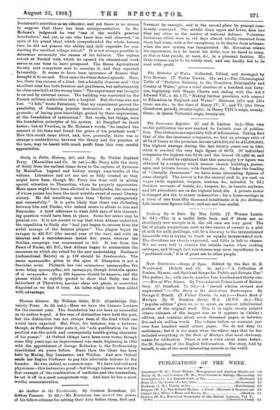Sicily in Fable, History, Art, and Song. By Walter Copland
Perry. (Macmillan and Co. 5e. net.)—Mr. Perry tells the story of Sicily from the earliest times down to the capture of Syracuse by Marceline. Legend and history occupy nine-tenths of the volume. Literature and art are not as fully treated as they might have been, though Mr. Perry has done well in giving special attention to Theocritus, whom he properly appreciates. More space might have been allotted to Bacchylides, the recovery of whose poems has been the most notable event of recent literary nistory. He did something more than "flatter outrageously and successfully." It is quite likely that there was ill-feeling between him and Pindar, who indeed seems to allude to him and Simonides. A brief reference to what Jebb says of this interest- ing question would have been in place. Some few errors may be pointed out. It is not correct to say that when Athens undertook the expedition to Sicily she "had just begun to recover from the awful scourge of the famous plague." The plague began its ravages in 430 B.C. (the second year of the war) and with an interval and a recrudescence lasted five years, whereas the Sicilian campaign was commenced in 415. It was from the Peace of Nicias, 421 B.C., that Athens began to accumulate the resources on which she relied for the new undertaking. Neodarnai (enfranchised Helots) on p. 118 should be Neodamodeis. The name sposaryoryiSes given to the spies of Dionysins is not a feminine noun. Plutarch has robs Kallowavovs arpogayarytaar, the noun being xpocrayorygns, not wpocricyoryls, though Aristotle speaks of al Torayoryilles. On p. 386 lerpairrat should be Airpairroi, and the phrase which is rightly quoted to show that Sicily was the fatherland of Theocritus, lipyripas ekes Bab xeovos, is somewhat disguised as we find it here. An index might have been added with advantage.


































 Previous page
Previous page